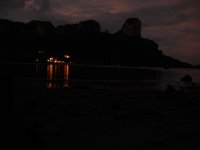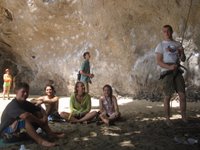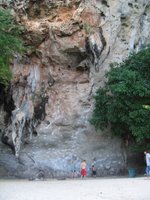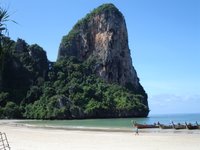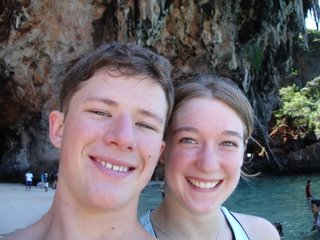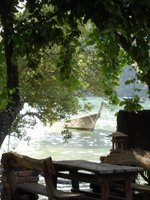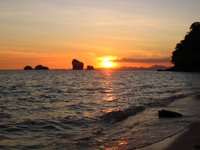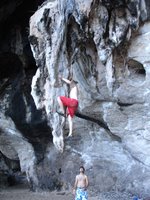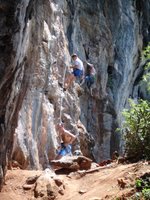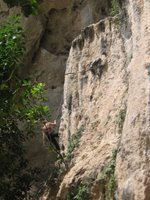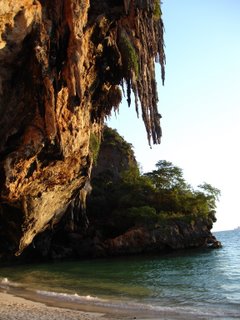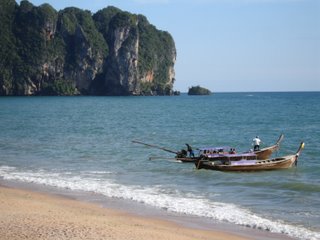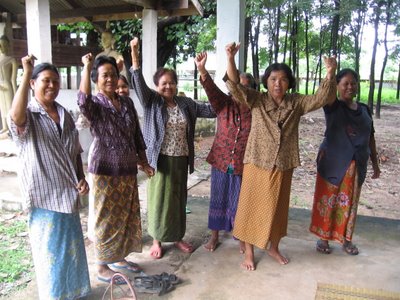Disregard that.
I was in a tuk-tuk on my way back to the university from downtown tonight, and I watched a dog run in front of us. Two lanes over, I watched him get hit by a truck, his head shatter, his leg fly off. There are puppies everywhere in Thailand, and they're real cute. But it's not hard to realize that they're not going to be taken care of. In the villages, they can probably live pretty happy and relatively safe lives. But in the city, they don't stand a chance. And now this image keeps replaying in my mind; it's gonna haunt me all night.
The reason I was downtown is that my roommate works for a radio station, and he's spent the last couple months putting together a concert. So my buddy Mikey came with me to the show at Club Chic. Let me first say that Thai pop music is bad. (There's really no other way to put it.) Oh well, half the show was an advertisement for Chang beer, with which my roommate played a very large part. I am anxious to ask him how he felt about that.
I was downtown again last night as well--Whitney and I stayed at a nice hotel, just to get away and relax. On our way we walked through the giant night market. And if you've never been to the market in a developing country, let me tell you that it's a charming experience. I think you could learn a lot about a country just by visiting the market. But oh, the smells. Rotting pigs feet, bees swarming inside some unnamed pastry, live eels in a giant bin, and turltes too (they're not for pets.) Exhaust, trash everywhere, wastewater everwhere. I almost caught myself saying, "I'll take the Big-C" (practically equivalent to Wal-Mart).
The other night we saw a girl laying flat on the sidewalk with a blanket, head on the curb. Today we passed a man with no legs doubled over himself, but still able to hold a cup out for money. And everyhwere, the dogs.
Finally, when we all traveled back to Bangkok a couple weeks ago, as we pulled into the same hotel we had stayed in during our first three days in Thailand, I was overwhelmed by the feeling of deja vu. But it was twinged with a different perspective. I was struck by the realization that although I'd been here before, two months later I was in an entirely different place. Khao San Road is full of tourists, and of the Thais who serve them. In my first blog entry from Thailand, I believe I described Bangkok using the same words I used about the market above: it has a certain charm. But this time, I could not ignore the impression that the Thais (and soon, our group, too) were unusually hostile and edgy. I also could not avoid the desire to know their stories (and this time, I had the ability to ask).
Like the fruit stand guy, who was from Isaan, the Northeast, where we have been staying.
Like the cab driver, who's been in Bangkok for 10 years, and says he likes it. But admits that his family is still in another province. And who, when asked if he misses them, simply doesn't respond.
Like the kid in Patpong, the sex district, with whom my friend Tabitha spoke with for most of the night. He rarely speaks with his family, but is able to send money home. He misses the sticky rice, the food. At the end of the evening, he has to leave the conversation and get on stage to compete with a couple dozen other kids for the opportunity to have sex with a 70-something foreign man.
It is the homestays, and the emphasis on learning about real life from real people, that makes the difference. I think my friend Eric sums up the idea well (the idea of humanizing the things we study, of making personal connections) in his article for our upcoming newsletter about his trip to the beaches over break:
"Immediately, I envisioned those I knew in Isaan in the place of the people currently renting gear to us tourists."
"I would want to understand how they arrived at their current situation, whether or not they are happy with it, and if there were any other options."
"I think this reflects the power of experience. It is often the case that facts or ideas learned in the classroom are forgotten, but memories of experiences rarely fade away. Experience changes one's perception, the way the world is perceived."

